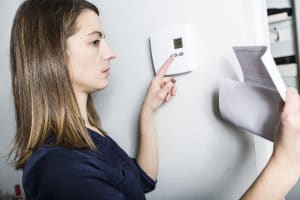 Heating requirements change with the seasons. After people finish panicking about air conditioning raising their cooling costs, cold weather and rising costs to heat your home bring that level of anxiety up again. There are a variety of ways that you can prepare your home for the winter chill. Here are some ideas on how to conserve heat in your home and lower your heating bill. The Sun Is Your Friend
Heating requirements change with the seasons. After people finish panicking about air conditioning raising their cooling costs, cold weather and rising costs to heat your home bring that level of anxiety up again. There are a variety of ways that you can prepare your home for the winter chill. Here are some ideas on how to conserve heat in your home and lower your heating bill. The Sun Is Your Friend Open your curtains; let the sunshine in. You can quickly reduce your heating costs by taking advantage of the heat shining on your windows during sunny days.
Cover Those Drafty WindowsUse heavy duty plastic or duct tape to seal drafty windows that could let in cold air. Investigate window treatments that help control the draft and seal or caulk portions of your windows that are exposed and contribute to the problem.
Drop Your ThermostatSet your thermostat at the lowest possible temperature where you maintain your comfort. When leaving your home for extended periods, lower the temperature 10 or 15 degrees to conserve energy. There are programmable thermostats where you can set schedules for the regular times you are out of the home, like for work or school. If you keep a regular schedule and looking to conserve energy, a programmable thermostat would be an excellent choice.
Close The LeaksInspect your home and see where you can correct problem areas. A common issue with heat conservation in the home is making sure that your crawl spaces are sealed, and outside rodents don’t have opportunities to burrow in your duct work and change your mission from heating your home to heating the outside. Check and repair any weather-stripping issues. Inspect your home for any areas that give the heat in your home room to escape.
Maintain Your Heating SystemRoutine maintenance on your heating system is a must. A malfunctioning heating system will not only not heat your home properly; it will also put a major dent in your wallet. It is important to keep the maintenance schedule on your heating system to that it can be in prime shape to do its job.
Close Your FireplaceIf your fireplace is not in use, close the damper. Keeping the damper of a fireplace open is like opening a window wide open – the air is sucked right through it, sucking money for your heating bill right along with it.
Complete an Energy AuditIn most cases, homeowners do not know the areas of their home that drain the most energy. It is in any homeowners’ best interest to conduct an energy audit or to have an energy audit done on their homes. This helps homeowners have an informed idea of the areas in their home that are sucking heating and cooling bills dry. It will also provide ways to correct the issues and save money.
Subscribe to Energy Home Pros's Blog

Comments